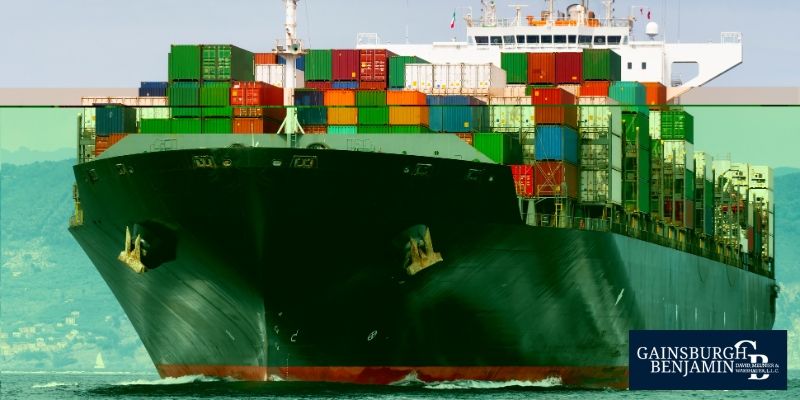|
|
Last Modified on Jun 23, 2025
Domestic shipping over waterways is an important element of the nation’s economy, and it is affected by many different laws, including the Jones Act of 1920. What is the Jones Act, and how does it affect U.S. shipping?
The Jones Act limits the ships allowed to transport merchandise domestically, which can impact several aspects of the process. The Jones Act also manages several other aspects of the maritime industry, including the rights of seamen and the benefits that workers can recover when they are injured.
The maritime industry is crucial in the U.S. and significantly impacts Louisiana. In 2023, the Bureau of Labor Statistics reported approximately 85,000 employees in water transportation, which includes maintaining and operating vessels on the water. This also includes 32,100 sailor and marine oiler jobs, 40,200 captains, mates, and pilots, and 9,500 ship engineers. The marine sector generally provides about 2.4 million jobs in the U.S. each year as of 2022.

The Basics of the Jones Act and U.S. Shipping
The Jones Act governs the rights of sea vessels to operate, shopping mortgages, and the rights of seamen and injured seamen.
The law requires that all shipping of goods from one U.S. port directly to another U.S. port is completed by a vessel that was built in the U.S., owned by a U.S. citizen, majority owned by U.S. citizens, and operated by a majority U.S. citizen or legal resident crew. This is the main portion of the law that affects shipping in the U.S.
There are waivers to this requirement, such as in the event of a natural disaster, in order to transport merchandise and supplies to locations affected by the disaster. There may also be waivers allowed for the Secretary of Defense or the Secretary of Homeland Security in specific cases. The Jones Act is enforced by the U.S. Customs and Border Protection.
The Benefits of the Jones Act for Shipping
The law exists to protect the domestic maritime industry and maintain its stability. It creates more jobs in the U.S. and domestic business revenue and avoids overreliance on foreign-made ships. The Jones Act provides protection for U.S. interests and economic stability for employers and employees.
The Drawbacks of the Jones Act for Shipping
The federal law impacts the cost of goods shipped domestically because there is a limited number of vessels that can ship between U.S. ports. This especially impacts shipping to the non-continental U.S., including Hawaii, Puerto Rico, Alaska, and other U.S. territories. These costs impact individuals and companies shipping domestically, who then pass those costs down to the consumers of the merchandise.

FAQs About Jones Act Affecting U.S. Shipping
What Is the Jones Act for Shipping?
The Jones Act impacts several areas of maritime work and commerce, including regulating shipping and requiring that all vessels that ship goods and merchandise between U.S. ports are:
- Built in the U.S.
- Owned by U.S. citizens
- Registered in the U.S., meaning crewed by U.S. citizens or permanent residents.
The goal of the law is to protect the maritime industry, generate U.S. maritime jobs, and benefit the nation’s economy. For individuals injured while working offshore, protections under the Jones Act are essential, and a qualified New Orleans Jones Act seaman injury lawyer can help ensure those rights are upheld.
How Does the Jones Act Affect the Cost of Cargo in the United States?
The Jones Act increases the costs of moving cargo between U.S. ports because of the restrictions on the vessels allowed to do this. The costs are affected by the following:
- The low supply of ships that are U.S.-owned, built, and operated for a high demand of domestic shipping
- Limited competition between shipping companies in the domestic market, meaning companies can increase prices
These prices primarily impact those shipping domestically within the U.S., not those shipping internationally.
What Are the Effects of the Jones Act?
The Jones Act has several impacts on the maritime industry and on maritime workers, including:
- Providing additional compensation for maritime employees who qualify
- Allowing maritime employees who qualify to file civil claims if their injuries are caused by their employer’s negligence
- Requiring that all ships moving goods from one U.S. port to another are U.S.-owned, made, and crewed
- Giving maritime employees certain rights while onboard a vessel, including the right to reasonable food, healthcare, and shelter
How Does the Jones Act Affect Cruise Ships?
The Jones Act covers shipping vessels and not passenger vessels, so the Jones Act itself does not affect cruise ships. Instead, another similar law has an effect like the Jones Act for passenger vessels: the Passenger Vessel Services Act of 1886. This requires that any foreign-made and foreign-flagged cruise ship cannot have an itinerary that goes from one U.S. port to another. Instead, there must be foreign ports in the itinerary.
How the Jones Act Impacts Injured Seamen
The water transportation industry has a fatality rate that is 4.7 times higher than the average U.S. employee in all industries. The Jones Act impacts shipping, but it also exists to provide these maritime employees with additional damages in specific cases.
Most employees can file a workers’ compensation claim when they are injured at work. These claims are useful because they don’t require an employee to prove that any party is at fault for the accident or for a developmental injury or illness. However, if an employer or coworker causes the accident due to negligence, the injured employee usually cannot file a civil claim and is limited to workers’ compensation benefits, which are more limited.
Maritime workers qualified under the Jones Act receive additional damages if they are injured at work, including maintenance and cure. If a maritime worker who qualifies under the Jones Act is injured by their employer’s negligence, such as operating an unseaworthy vessel or other safety hazards, they can file a civil claim.
These cases can be complicated, but they can recover much more compensation than a workers’ compensation claim. It is crucial that injured seamen work with an attorney who understands the complexities of the Jones Act.
At Gainsburgh, Benjamin, David, Meunier & Warshauer, L.L.C., we understand the Jones Act and other federal maritime laws and how they affect workers. If you have been injured on the job, we want to help you get the most financial recovery possible. Contact our team to schedule a consultation, and let us determine what methods of recovery you qualify for.







